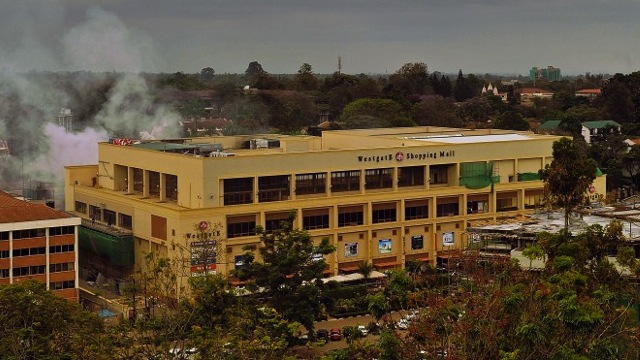SUMMARY
This is AI generated summarization, which may have errors. For context, always refer to the full article.

NAIROBI, Kenya – Somalia’s Shebab on Friday, September 27 threatened fresh attacks against Kenya, as police scoured the smoking rubble in Nairobi’s Westgate mall devastated by their assault for bodies and clues.
The Al-Qaeda linked Shebab gloated at the massacre of at least 67 people in the mall, which saw a group of gunmen storm the part Israeli-owned complex at midday Saturday, firing from the hip and hurling grenades at shoppers and staff, before holding off Kenyan and foreign forces with a barrage of bullets for four days.
“The mesmeric performance by the Westgate Warriors was undoubtedly gripping, but despair not folks, that was just the premiere of Act 1,” the group said in one of a string of messages posted on Twitter overnight.
Since President Uhuru Kenyatta announced an end to the unprecedented 80-hour siege late Tuesday, September 24, the Shebab have claimed responsibility for an attack Thursday, September 26, on a police compound on the border with Somalia, killing two officers.
Attacks are common in Kenya’s northeastern border with Somalia, with regular grenade blasts or shooting ever since Kenyan troops crossed into southern Somalia two years ago to attack Shebab bases.
Kenya meanwhile entered its third and final day of official mourning, with flags at half mast across the country.
Dozens of prayer meetings were held while counseling centers are supporting relatives of the 61 people listed as missing after the attack, one of the worst in Kenya’s history.
Close to 200 people were wounded in the four-day carnage, which saw running battles between militants and security forces in the complex, one of Nairobi’s largest shopping centers, which was popular among wealthy Kenyans, diplomats, UN workers and other expatriates.
Police have pleaded for patience as Kenyan and international teams – including from Britain, the United States, Israel, Germany, Canada and Interpol – combed the charred rubble of the devastated mall for dozens still missing.
With around a third of the building collapsed – as though hit by an earthquake – and with the risk of booby traps amongst the mangled wreckage, the work of international forensic and security experts scouring the vast complex for bodies and clues will take days to complete.
Top Interpol official Jean-Michel Louboutin, speaking near the mall, told Agence France-Presse the challenge for investigators was to try “to remove the three levels that collapsed and see what is underneath”.
Interpol issued an international arrest notice at Kenya’s request for 29-year-old Samantha Lewthwaite, dubbed the ‘White Widow’, a reference to her marriage to one of the suicide bombers who killed 52 people in London’s July 2005 terror attacks.
Nairobi accuses her of alleged links to the Shebab and the possession of explosives in a 2011 plot, and there has been widespread media speculation over her possible role in Nairobi’s deadly siege, despite no concrete evidence so far.
Five suspected attackers were killed in the mall and 11 other people detained, officials said.
The Shebab boasted that the “Kenyan government is still in disarray”, saying it “won’t be until several months when it fully comprehends exactly what took place at Westgate”.
Shebab chief Ahmed Abdi Godane said the Nairobi mall carnage was retaliation for Kenya’s 2011 invasion of southern Somalia.
But Kenya also sought to shrug off the threats, with the government issuing a defiant statement to say plans to raise close to $1.5 billion (1.1 billion euros) in a debut international bond issue were unaffected.
“The Kenyan economy, just like the spirit of our people, is unshaken by the recent tragedy,” Treasury Secretary Henry Rotich said in a statement.
“We do not see any significant effect on the overall economic performance arising from the recent tragedy,” he added.
Still the country remains traumatized.
Somalis living in Kenya are terrified of retaliatory attacks, against the half a million refugees as well as members of the native ethnic Somali community.
Human Rights Watch said Friday that after far smaller attacks in the past, police responded with “widespread abuses against the Somali Kenyan and Somali refugee communities”.
Police “should take steps to protect all Kenyan residents from retaliation, including immigrant communities and refugees,” HRW said. – Rappler.com
Add a comment
How does this make you feel?
There are no comments yet. Add your comment to start the conversation.